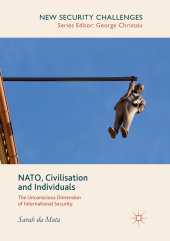 Neuerscheinungen 2019Stand: 2020-02-01 |
Schnellsuche
ISBN/Stichwort/Autor
|
Herderstraße 10
10625 Berlin
Tel.: 030 315 714 16
Fax 030 315 714 14
info@buchspektrum.de |

Sarah da Mota
NATO, Civilisation and Individuals
The Unconscious Dimension of International Security
Softcover reprint of the original 1st ed. 2018. 2019. xi, 241 S. 210 mm
Verlag/Jahr: SPRINGER, BERLIN; SPRINGER INTERNATIONAL PUBLISHING 2019
ISBN: 3-03-008984-3 (3030089843)
Neue ISBN: 978-3-03-008984-9 (9783030089849)
Preis und Lieferzeit: Bitte klicken
This book critically engages with NATO´s two main referent objects of security: civilisation and individuals. By rethinking the seemingly natural assumption of these two referent objects, it suggests the epistemological importance of an unconscious dimension to understand meaning formation and behaviour change in international security.
The book provides a historicised and genealogical approach of the idea of civilisation that is at the core of the Alliance, in which human needs, narratives, and security arrangements are interconnected. It suggests that there is a Civilised Subject of Security at the core of modern Western security that has constantly produced civilised and secure subjects around the world, which explains NATO´s emergence around a civilisational referent. The book then proceeds by considering the Individualisation of Security after the Cold War as another stage of the civilising process, based on NATO´s military operations in Bosnia-Herzegovina, Kosovo and Afghanistan.
1. Chapter 1/Introduction. Seeking alternative connections between civilisation and security 1.1. The unconscious question 1.2. Questioning NATO´s change 1.3. The problem of time 1.4. The argument 2. Chapter 2. IR´s disciplinary connections with Western civilisation 3. Chapter 3. Individualising civilisation: the Civilised Subject of Security 3.1. The civilised habitus 3.2. The unconscious dimension of security 4. Chapter 4. Standards of Civilisation: architecting security, order, and hierarchy 5. Chapter 5. NATO´s deep origins (1939-1949): unbreaking the civilised habitus? 5.1. World War II: barbarism unleashed 5.2. The never civilised Soviet Union? 5.3. A "spiritual union": a tool for self-restraint? 5.4. Rearranging security, repositioning power: the process of rebuilding interdependence among the civilised 6. Chapter 6. NATO´s Cold War evolution: civilisation from referent object to standard 6.1. The Treaty: making a new standard, continuing the civilised habitus 6.2. The 1950´s - 1960´s: "the peril from disunity" 6.3. The 1970´s - 1980´s: "the pace of change is accelerating" 7. Chapter 7. Post-Cold War NATO: new ways and reasons for coexistence 7.1. The new Strategic Concept (1991): continuity amidst the new (in)security environment 7.2. ´The promise of democracy is for the civilised only´: setting the standards for Partners and new members 8. Chapter 8. The Individualisation of Security: a new architecture for international security 8.1. The Individualisation of Security as the consecration of a value-based system 8.2. The Individualisation of Security in the hands of the military: reproducing civilising power 9. Chapter 9. The Individualisation of Security within NATO 9.1. Bosnia: from "Denying Flight" to "Deliberate Force" 9.2. Kosovo: the "Allied Force" 9.3. Afghanistan: taking command of ISAF 10. Chapter 10. Conclusion
Sarah da Mota is currently researching astropolitics and the impact of space exploration for IR, peace and security. She has co-authored Drones and the uninsurable security subjects (Third World Quarterly) and Visibility and Politics: an Arendtian reading of US drone policy (Na‡Æo e Defesa).


